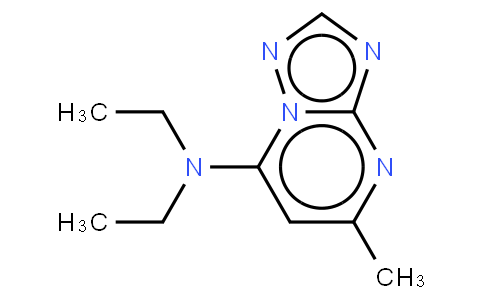Trapidil is a PDGF antagonist that can inhibit the proliferation of the PDGF-producing glioma cells.
Trapidil interrupts the autocrine loop at the PDGF and PDGF-receptor level.Trapidil has proved to possess a significant antiproliferative activity. The addition of 100 to 400 g/ml trapidil significantly reduced cell proliferation induced by different growth factors (FCS, PDGF-BB, bFGF, EGF), the highest inhibitory effect being on PDGF-BB stimulated Mesangial cell(MC) growth. The effect of the drug was dose-dependent and seemingly specific. Trapidil is an anti-platelet drug active against various aggregating agents, such as collagen, ADP, arachidonic acid, PAF and calcium ionophore. It exerts its action by blocking the biosynthesis of thromboxane A2 and antagonizing its effect at the receptor level, and by stimulating the synthesis and release of prostacyclin. Trapidil strongly inhibited osteoclast formation in co-cultures of bone marrow cells and osteoblasts without affecting receptor activator of NF-B ligand (RANKL) or osteoprotegerin expression in osteoblasts. In addition, trapidil suppressed RANKL-induced osteoclast formation from osteoclast precursors. Trapidil reduced RANKL-induced expression of nuclear factor of activated T cells, cytoplasmic 1 (NFATc1), a master transcription factor for osteoclastogenesis, without affecting the expression of c-Fos that functions as a key upstream activator of NFATc1 during osteoclastogenesis. Trapidil has also been reported to inhibit phosphodiesterase, thromboxane A2, and CD40 signaling and activate protein kinase A.
For research use only. We do not sell to patients.

